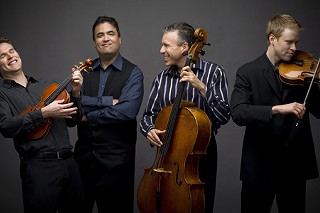A Love Supreme – The Music of John Coltrane
Turtle Island Quartet's tribute to the jazz genius was fresh and thrilling
Reviewed by Michael Kellerman, Fri., July 3, 2009
A Love Supreme – The Music of John Coltrane
Bates Recital Hall
June 27
It's impossible to avoid hyperbole in any reference to A Love Supreme, John Coltrane's 1965 recording that brought to the world jazz's spiritual, barrier-shattering genius at the artistic crossroads of bebop and free jazz. The recording has endured as a crucible of inspiration for countless artists since, a fact clearly evident as the audience swarmed Bates Recital Hall to hear the Turtle Island Quartet, recently rewarded with a Grammy for its tribute to Coltrane's definitive opus.
This performance took place smack in the middle of the 13th Austin Chamber Music Festival. In her introduction, Artistic Director Michelle Schumann told the crowd how she had strived to "turn up the heat considerably for this [year's] festival, focusing on artists who have torn down traditional barriers and shattered the ceilings of expectation." The 104-degree swelter notwithstanding (can any current article on Austin avoid reference to 2009's early scorcher?), Schumann couldn't have been more dead-on in her choice of an artist to heat things up than Turtle Island Quartet.
The ensemble has created its own niche in the music world, utilizing the traditional quartet lineup to explore forms outside the norm. Over 24 years, Turtle Island has prospered wildly outside the box, exploring bluegrass, swing, bebop, R&B, rock, hip-hop, and other genres while racking up more than a dozen recordings. Founding members David Balakrishnan (violin) and Mark Summer (cello) are also accomplished composers and arrangers who, with newer members Mads Tolling (violin) and Jeremy Kittel (violist and U.S. National Scottish Fiddle champion), have created a repertoire that is unique for chamber music, one that has its heart in the jazz quartet tradition.
One of the key components of Turtle Island's performance style is improvisation. Though this may seem novel for a chamber music ensemble, the artists reminded the audience that before the late baroque era, when the string quartet form solidified, string musicians spent much time improvising. This was the quartet's way of implying, "Remember, what you are seeing isn't new." New, perhaps not; but thrilling and fresh? Certainly.
The first half of the performance gave the ensemble a chance to cover some eclectic ground. This included a swinging, soloistic "Wapango," by Paquito D'Rivera; a driving, modal "Model Trane," a piece written by the quartet that celebrated the members' experimental, interactive talents; and an atmospheric take on Chick Corea's "No Mystery."
For the second half, Coltrane took center stage. For "Moment's Notice," the musicians created a loose, assured summery mood that quickly shifted for "Naima," Coltrane's lush, dense ballad written for his first wife. Then came "A Love Supreme," split into four movements. The first stripped the work to its essentials, during which the members passed solos around in a thrilling and unified whole. Though the individual players have their own styles and mastery, in the piece's unified moments the ensemble played as one voice, nailing the complexities of rhythm, texture, and tone that reminded the audience that their spirited, playful demeanor is backed up by talent, practice, and training of the highest levels. Each member had a moment in which to stand out, but special mention should go to Kittel, whose inspired solo bridged the inner movements.
It was clear from start to finish just how passionate each member was for the music they were making – from the constant eye contact among the musicians to the way that the members celebrated one another after each piece. This is a tremendous gift to an audience. By inviting us into their process with such ease, they make the experience a degree more personal, and we are challenged to listen harder. If this is what Michelle Schumann meant when she introduced her vision of "music for the people," Turtle Island made supreme good on her promise.











